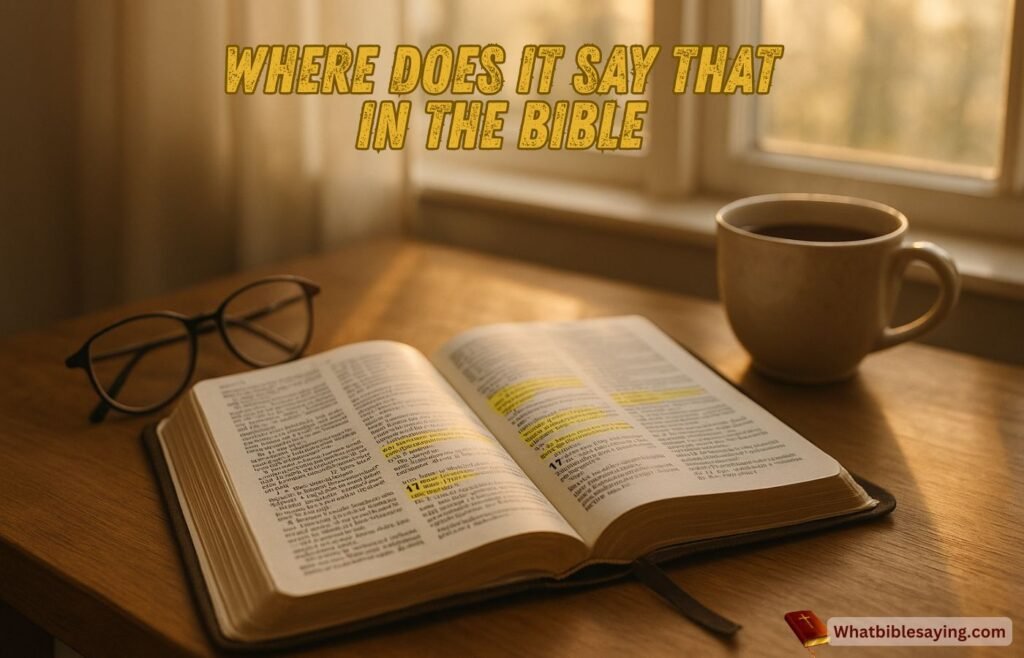 If you’ve ever heard someone say something like “Faith moves mountains”, or “Jesus wept”, and found yourself wondering, “Where does it say that in the Bible?”, you’re not alone. Many of us grew up hearing Bible verses quoted in sermons, songs, or conversations, but never saw them in print for ourselves.
If you’ve ever heard someone say something like “Faith moves mountains”, or “Jesus wept”, and found yourself wondering, “Where does it say that in the Bible?”, you’re not alone. Many of us grew up hearing Bible verses quoted in sermons, songs, or conversations, but never saw them in print for ourselves.
And let me tell you, as someone who has spent a lifetime reading and teaching the Bible, I still find joy when someone says, “Wait, is that really in the Bible?”
Because that curiosity? That spark? That’s often the Holy Spirit tugging on your heart to look deeper.
In this devotional article, we’re going to explore some of the most frequently quoted or asked-about Bible phrases. I’ll show you where they are in Scripture, explain what they mean, and help you connect those truths with your own life.
“Faith Can Move Mountains” , Where Does That Come From?
Matthew 17:20 (NIV)
“Truly I tell you, if you have faith as small as a mustard seed, you can say to this mountain, ‘Move from here to there,’ and it will move. Nothing will be impossible for you.”
This verse often gets paraphrased into “faith moves mountains,” and while that isn’t a direct quote, it beautifully captures the heart of Jesus’ teaching.
Jesus said these words after His disciples couldn’t cast out a demon. He pointed out that their lack of faith held them back, not their lack of knowledge or strength. It wasn’t about how big their faith was, but how real it was.
What It Means for You:
You don’t need perfect faith. You don’t need to know the whole Bible. Even mustard-seed faith, raw, shaky, but honest, can stir heaven. Don’t underestimate the power of simply believing that God hears you.
“Jesus Wept” , The Shortest and Most Powerful Verse
John 11:35 (KJV)
“Jesus wept.”
That’s it. Two simple words.
But this little verse carries the weight of heaven’s heart. Jesus stood outside the tomb of His dear friend Lazarus, surrounded by mourners, and He cried. Not because He was helpless, He was about to raise Lazarus from the dead! But because He felt what others felt.
What It Means for You:
Jesus doesn’t stand far off from your pain. He weeps with you. He grieves with you. You are never alone in your sorrow. The Son of God cried, and that means your tears are holy too.
“Trust in the Lord with All Your Heart” , But Where?
Proverbs 3:5–6 (NIV)
“Trust in the Lord with all your heart and lean not on your own understanding;
in all your ways submit to Him, and He will make your paths straight.”
This verse is a favorite at graduations and weddings, but it’s more than a quote, it’s a lifelong invitation.
What It Means for You:
When you face decisions that feel confusing or heavy, God doesn’t ask you to figure it all out. He asks you to trust Him. Even when it’s unclear. Even when it’s hard. He’ll guide your steps.
“God Helps Those Who Help Themselves” , Is That in the Bible?
Answer: No.
This phrase is often quoted like Scripture, but it’s actually not in the Bible at all. In fact, it came from a political essay by Benjamin Franklin.
The Bible paints a different picture. Over and over again, it shows God helping the helpless, the broken, the poor, the sick, the sinner.
Romans 5:6 (NIV)
“You see, at just the right time, when we were still powerless, Christ died for the ungodly.”
What It Means for You:
You don’t need to be “good enough” to ask God for help. He meets you in your weakness, not after you’ve fixed yourself.
“This Too Shall Pass” , Scripture or Saying?
Answer: Not directly in the Bible.
While “This too shall pass” is not a Bible verse, the idea behind it is true: seasons of hardship do not last forever.
2 Corinthians 4:17–18 (NIV)
“For our light and momentary troubles are achieving for us an eternal glory that far outweighs them all.”
What It Means for You:
Whatever trial you’re facing, it won’t be forever. God sees the big picture, even when you can’t. Keep walking. There is hope beyond this valley.
“Do Not Be Afraid” , How Many Times?
It’s often said that “Do not be afraid” appears 365 times in the Bible, one for every day of the year. While that number varies depending on translation and phrasing, the heart of the statement remains strong: God consistently tells His people not to fear.
Here are just a few places it shows up:
Isaiah 41:10 – “So do not fear, for I am with you…”
Joshua 1:9 – “Do not be afraid; do not be discouraged…”
Luke 12:32 – “Do not be afraid, little flock…”
What It Means for You:
Fear may visit, but it doesn’t have to stay. God is present, powerful, and deeply personal. He knows your name, and He’s not leaving.
“Love Your Neighbor as Yourself” , Where’s That From?
Mark 12:31 (NIV)
“Love your neighbor as yourself.”
Jesus said this was the second greatest commandment, right after loving God. But did you know He was quoting the Old Testament? It’s originally from Leviticus 19:18.
What It Means for You:
Loving people isn’t optional in the life of a believer. It’s a command. When we love others with grace, kindness, and patience, we’re walking in step with the heart of Christ.
“God Is Love” , Really?
1 John 4:8 (NIV)
“Whoever does not love does not know God, because God is love.”
God isn’t just loving. He is love. His very nature is to give, forgive, embrace, redeem, restore.
What It Means for You:
If you ever doubt whether you are lovable, remember this: you were loved before you were born. Loved before you believed. Loved through every failure. God doesn’t just act with love. He is love.
“I Can Do All Things” , What Kind of Things?
Philippians 4:13 (NKJV)
“I can do all things through Christ who strengthens me.”
This verse is often quoted during sports games or big dreams. But Paul actually wrote it while in prison, talking about being content whether hungry or well-fed.
What It Means for You:
This verse isn’t about doing everything you want, it’s about enduring everything you face with Christ’s strength. Whatever your season, He is enough.
“Come to Me All Who Are Weary” , Where Is This?
Matthew 11:28–30 (NIV)
“Come to me, all you who are weary and burdened, and I will give you rest.”
Jesus didn’t invite the strong or successful. He invited the tired, the burdened, the burned out. That includes you and me.
What It Means for You:
You don’t need to carry it all alone. You don’t need to be okay all the time. You’re invited to rest, not just physically, but spiritually, in the arms of Jesus.
Why It Matters Where Things Are in the Bible
Knowing where a phrase comes from helps you know what God really said, and what He didn’t.
It protects you from confusion.
It builds your faith.
It helps you speak truth to others, with love.
So next time you hear someone say, “Where does it say that in the Bible?”, you’ll have an answer. And maybe even a little smile, because you’ve learned not just the words, but the heart behind them.
Keep asking. Keep learning. Keep trusting.
And above all… keep opening your Bible.












